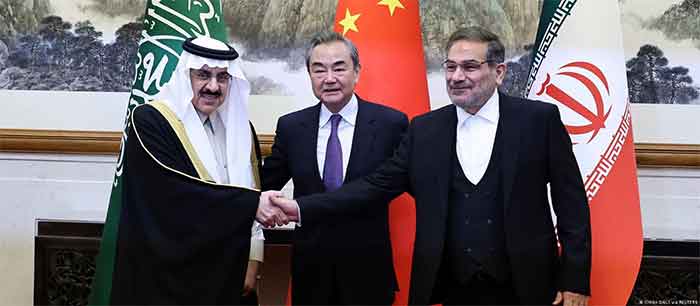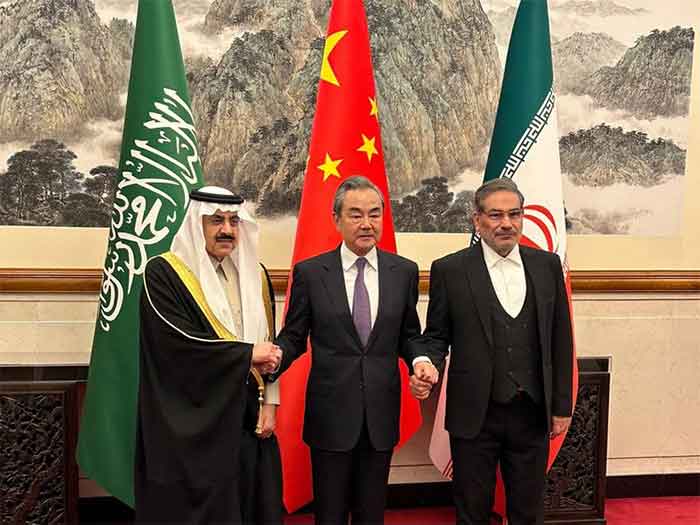
Irrespective of the negative campaign which United States and its allies seem to have been engaged in against China and Russia, several developments suggest that this hasn’t succeeded in turning more countries against the two. Uncle Sam has all the reasons to be totally dissatisfied by this. The diplomatic era when even a minor signal from Washington seemed sufficient to almost instantly turn potential and actual allies to its side seems to have suddenly disappeared. Of this, resumption of diplomatic ties between Saudi Arabia and Iran, with China playing a key diplomatic role is recent instance. This Sunday (April 2) was marked by telephonic conversation between foreign ministers of the two countries. The ministers discussed issues of common interest and “next steps in light of the recent tripartite agreement,” which was reached last month between China, Saudi Arabia and Iran. With a major role played by China, Saudi Arabia and Iran agreed to reestablish diplomatic ties and reopen their embassies following around seven years of tension between the two. A joint statement was issued between the three on March 10 signaling a major diplomatic step in this direction.
Clearly, the significance of this diplomatic handshake cannot be confined to just bilateral and/or tri-lateral level. Ahead of five days of detailed and intense negotiations in Beijing, closed-door talks between Saudi Arabia and Iran were held in Iraq and Oman over a period of two years. This signals that Riyadh and Tehran have been seriously deliberating on restoring their diplomatic relations for quite some time, at least a few years. The reality that China has played the key diplomatic role in inking March 10 statement at Beijing bears its own significance at several levels. Of these, the most prominent is the shockwaves it has probably spelt for Washington and its allies. The possibility of US being pleased about China strengthening its importance in Middle East does not prevail.
Paradoxically, howsoever displeased US maybe about this deal, owing to its sour relations with China and Iran, the superpower and Saudi Arabia entertain fairly warm ties. And this point probably has placed Washington in a fix. The tripartite agreement is just another signal from Saudi Arabia, that this Kingdom doesn’t want disturbed relations with both China and Iran. No less crucial is probably Saudi Arabia’s stand on Ukraine-crisis. The Kingdom has favored peace and displayed no inclination of allying with US in taking a stand against Russia.
It is pertinent to understand as to what is suggested by these diplomatic signals. The role played by US in the name of Arab Spring appears to have cautioned Gulf countries quite seriously about not easily and/or instantly going by diplomatic messages of Washington. The stand adopted by these countries regarding Ukraine-crisis as well as towards Russia suggests that they prefer maintaining ties with US, Russia as well as China rather than being totally aligned to any one power bloc. The countries which have shown preference for and pursuance of this diplomatic strategy are also probably wary of being caught in any dependency trap- that of being in one camp and against another. Their preference for peace – with specific reference to Ukraine-crisis- also signals their refusal to be a party to any external warfare.
Diplomatic turn taken by Riyadh-Tehran with help of other Gulf States and China has also compelled analysis of Saudi Arabia’s relations with US from a new angle. This is strongly suggestive of Riyadh pursuing its diplomatic ties “independently” without being subject to any possible pressure-tactics exercised by United States.
Given that Gulf countries were silently engaged in this direction for quite some time, what can be gauged by diplomatic stamp added by China? Perhaps, this may be viewed as crucial from several angles. First, this apparently marks the seriousness with which Riyadh and Tehran have taken this step. Were the joint statement confined to bilateral level, it may not have been viewed as seriously by others as the trilateral statement is being. Secondly, China certainly has reason to feel pleased about strengthening its diplomatic position in Middle East. As Beijing entertains good ties with Riyadh as well as Tehran, tripartite agreement was made possible. Simply speaking, this may not have been possible by any other major power, probably even superpower) because of it being inclined towards only one country and/or entertaining a strong policy against the other.
Notwithstanding this backdrop, it is as yet too early to be over-optimistic about the long term credibility of Riyadh-Tehran ties. Nevertheless, the fact that this key diplomatic step has been taken bears its own significance, unilaterally, bilaterally, regionally as well as globally. Unilaterally, as suggested earlier, Saudi Arabia has signaled its decision, if need be, to pursue its diplomatic strategies at its own level. Bilaterally, several years of hostility have apparently cautioned Riyadh and Tehran of this phase spelling probably more damages than gains. It is also possible, they don’t want their bilateral ties to be viewed as symbolic of hostility at a larger level. The efforts made by other regional countries to end Riyadh-Tehran hostility apparently signals their also entertaining this stand.
Clearly, this is a strong message for US, Russia as well as China. The entire world does not want to become involved in hostility and war-games they entertain or pursue against each other. Ironically, this is possible, as indicated by Riyadh’s diplomacy of entertaining good ties with the three. There was a phase when Non-Aligned Movement (NAM) was given great importance, with emphasis on not being formally aligned with or against any power bloc. NAM’s limited importance is marked by US-camp aligned against Russia and China. Saudi Arabia has opted for good ties with the three. Though India’s ties with China are at present tensed, the country has not let its ties with either US or Russia be disturbed because of their hostility.
US is certainly not pleased by these diplomatic signals. These are also probably suggestive of at least some decline in importance accorded to its diplomatic strategies. Rather than be guided by these, the number of countries opting to pursue their own diplomatic strategies seems to be increasing. It is time US and Russia gave greater importance to diplomatic moves than to pursuing and propagating war as well as indulgence in war-moves. It is possible speculations about a possible World War are deliberately being floated to polarize the world into strong camps. Limited impact of this move is suggested by March 10-trilateral statement and the increasing stress laid on peace-plan to solve Ukraine-crisis. Nothing is impossible, as suggested by Riyadh-Tehran handshake!
Nilofar Suhrawardy is a senior journalist and writer with specialization in communication studies and nuclear diplomacy. She has come out with several books. These include:– Modi’s Victory, A Lesson for the Congress…? (2019); Arab Spring, Not Just a Mirage! (2019), Image and Substance, Modi’s First Year in Office (2015) and Ayodhya Without the Communal Stamp, In the Name of Indian Secularism (2006).












































